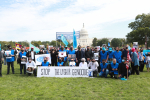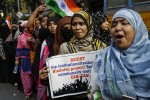International Religious Freedom Advocacy Unites Washington
Delegates from all over the globe descended on Washington, D.C. for this year’s annual International Religious Freedom Summit on January 31 and February 1. Leaders, lawyers, influencers, and communicators at the forefront of the call for universal religious freedom came together to engage and find ways to advance freedoms globally. The IRF Summit, a civil society offshoot of the U.S. Government’s Ministerial on International Religious Freedom, stands for the proposition that everyone around the world should be allowed the freedom to have faith, choose their faith, or have no faith at all.
Amidst the ongoing seminars and roundtables, many U.S. leaders from both sides of the aisle were seen leading and joining the conversation. While tensions between parties remain at a constant high elsewhere in D.C., the IRF Summit creates a home for a unified dialogue on the importance of religious freedom.
Sam Brownback, former Ambassador-at-Large for International Religious Freedom for the Trump Administration, served as co-chair of the event while Rashad Hussain, current Ambassador-at-Large for International Religious Freedom under President Biden, led conversations on the plenary stage on the importance of religious freedom for all. Both Brownback and Hussain have held instrumental voices in the religious freedom movement.
U.S. Senator Jacky Rosen (D-NV) served as a speaker and Honorary Senate Co-Chair of the IRF Summit while U.S. Senator James Lankford (R-OK) led as a speaker and panelist in the event’s track on the denial of religious freedom around the world. Rosen and Lankford have worked together to promote religious freedom in the U.S. Senate and beyond. Most notably, they founded the Senate Bipartisan Task Force for Combating Antisemitism, a task force that is comprised by a large group of Democrats and Republicans alike.
Also in attendance were U.S. Representatives Mike McCaul (R-TX) and Gregory Meeks (D-NY), who both served as speakers and as Honorary House Co-Chairs. McCaul and Meeks have served on the House Foreign Affairs Committees, both as members and as Chairman. As leading voices in the committee, they have promoted religious freedom around the world, and called for the 2022 Winter Olympic Games to be relocated away from China due to the harsh oppression and persecution against the Uyghur community.
While these are just a few of the many U.S. leaders in attendance, the evidence is clear: international religious freedom is largely a bipartisan issue. Political opponents can and should become allies when it comes to advancing the most basic of human rights abroad, including religious freedom.
If the religious freedom movement is to continue to advance globally, this kind of unity from the leaders of the free world is necessary. Despite efforts to preserve the right to religious freedom, many are still suffering under egregious, draconian laws. The rights to choose, change, and speak about religion, let alone worship freely in community, are severely under attack. An increasing number of religious minorities around the world face torture, prison, death, and even genocide for peaceably living out their faith.
Nigeria is one of seven countries in the world where an individual can be sentenced to death for simply sharing his religious beliefs. Last year, Yahaya Sharif-Aminu, a Sufi Muslim musician, was sentenced to death for posting song lyrics on social media that were deemed blasphemous. Efforts are under way to overturn not just his conviction, but also the blasphemy laws widespread in Northern Nigeria at the Supreme Court of Nigeria.
In India, thousands of Christians are fighting for their lives following attacks from Hindutva radicals in the Indian state of Chhattisgarh. Mobs attacked churches and beat anyone suspected of being a Christian, all under efforts to forcibly convert Christians. Eleven Indian states have anti-conversion laws in place that effectively target religious minorities and support efforts by radical groups to persecute those whose who do not share their beliefs.
These are just two of many instances around the globe where people of faith are being denied their right as humans to worship freely.
Unified voices are the most effective. The U.S. has a two-party system for a reason – varied opinions on policies and preferences represent the many voices of the American people, and robust debate is a major component of Democracy. However, every American in leadership – whether they hold a seat at the table in the White House, whether they serve in the U.S. Congress, whether Democrat or Republican, or whether they represent civil society – should join the united voice that condemns violence, denounces unjust laws, and speaks up for those being denied basic freedoms around the world.
Religious freedom for all can be achieved only when those with the ability to affect change speak up, together.







